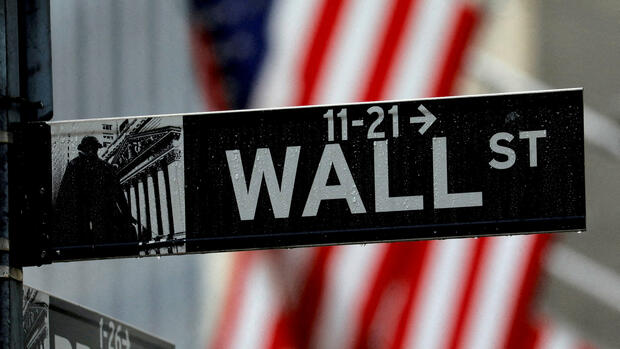new York Fearing a tighter monetary policy from the Fed, investors are only touching US stocks with fingertips. After the extended weekend due to the holiday, the US standard value index Dow Jones closed 0.7 percent lower on Tuesday at 34,053 points. The tech-heavy Nasdaq fell 0.2 percent to 13,667 points. The broad S&P 500 lost 0.5 percent to 4388 points.
In the past few days, some leading US central bankers had hinted at further interest rate hikes because inflation was only slowly falling. That’s why investors have been eagerly awaiting Federal Reserve Chair Jerome Powell’s semi-annual hearing before a congressional committee on Wednesday.
Art Hogan, chief investment strategist at financial services firm B. Riley, said he is likely to be very cautious about commenting on monetary policy sentiment among Fed executives. “Because a lot of economic data will be released before the next meeting in July.”
Interest rate hike speculation was also fueled by the strongest rise in US housing starts in around three decades. Despite high interest rates in the USA, the residential construction business picked up surprisingly strongly in May. Projected for the year as a whole, the number of newly started projects increased by 21.7 percent to 1.631 million. Experts interviewed by the Reuters news agency had only expected 1.4 million. The number of building permits as an indicator of future building activity rose by 5.2 percent in May to an annualized 1.491 million.
“Despite all the recession warnings, the economy is more robust than expected,” said Sam Stovall, chief investment strategist at the research house CFRA. The shares of home builders such as Toll Brothers, Lennar, DR Horton and Pultegroup then rose by up to 2.5 percent.
China’s central bank disappointed with interest rate cut
The monetary policy of the Chinese central bank also weighed on the overall mood. The People’s Bank of China (PBoC) lowered interest rates to stimulate the ailing economy in the People’s Republic. However, the step was 0.1 percentage points lower than hoped. “Investors see this as insufficient to support the expected economic recovery,” said Richard Flax, chief investor at money manager Moneyfarm.
As a result, some investors dumped US shares in Chinese companies from their portfolios. The corresponding exchange traded funds (ETFs) of KraneShares and iShares fell by up to 5.7 percent. Titles of Chinese companies such as Alibaba or JD.com slip by up to 6.7 percent.
US stock market expert Koch: “The warnings on Wall Street are increasing again”
CNBC host Jim Cramer, known for his TV show Mad Money, advises investors to hold off while the market is so overbought. The indices have risen too high too quickly.
Investors will get a chance to get good stocks at cheaper prices. “So why not wait?” Cramer asked rhetorically.
The ongoing rally in the US markets is particularly difficult for the short sellers. According to data from the analysis company S3, so-called short sellers have around 120 billion dollars in so-called “mark-to-market losses” this year, i.e. if you use the current market value. In the first half of June alone, the loss was $72 billion.
Short sellers borrow shares and then sell them, hoping to later buy them back at a lower price and reap the difference as profit.
In recent weeks, with the S&P 500 climbing to a 14-month high, they have been increasing their bets on the downside. The index is up 15 percent in 2023 and 5.5 percent in June alone.
Total short interest in the U.S. market surpassed $1 trillion this month, the highest level since April 2022, according to data from S3 Partners.
That’s up from $863 billion at the start of the year and represents about 5 percent of all shares available for trading, according to the Wall Street Journal.
Look at individual values
Alibaba: Shares listed in the US fell by almost five percent. CEO Daniel Zhang is stepping down at the Chinese e-commerce giant and being replaced by Eddie Wu, one of Alibaba’s co-founders. The move follows the company’s announcement in March that it would reorganize its business into six business groups.
Dice Therapeutics: Eli Lilly wants to acquire the company for $48 a share in cash, a valuation of $2.4 billion. Biopharmaceutical company Dice Therapeutics’ shares rose about 37 percent to $46.44. Dice is a good addition to Eli Lilly, praised analyst Luise Chen from the investment bank Cantor Fitzgerald. Eli Lilly titles gained a good one percent.
Thermo Fischer/Danaher: Sartorius’ profit warning sent shares in US competitors Thermo Fisher and Danaher plummeting. The two laboratory equipment suppliers each lost around two percent on Wall Street, which was closed on Monday due to a US holiday. However, Sartorius has so far been optimistic in the industry comparison, writes analyst Dan Brennan. The reduced annual targets are now at the level of the competition.
Notification budget: Shares rose more than 6 percent in the course of trading after Morgan Stanley upgraded the stock from “Equal Weight” to “Overweight.” Analyst Adam Jonas also increased his price target from $182 to $230, which means an upside potential of 12.6 percent. Jonas highlighted Avis’ proven track record in fleet risk management and lower operating costs as a percentage of revenue.
Warner Bros Discovery: The media and entertainment conglomerate’s stock slipped more than three percent. The film The Flash grossed an estimated $55 million in its first three-day weekend, less than the $75 to $85 million the industry was expecting.
Carnival: The stock was up about half a percent at times, building on gains from last week when the stock was the best performer in the S&P 500. Cruise stocks are on the up this year as companies recover from the Covid pandemic – the last in the travel industry to do so.
With agency material
More: USA in the bull market – Three funds with which investors can benefit
